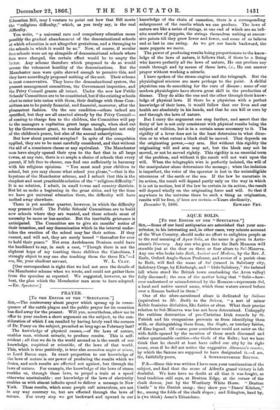PRAYER.
[To THE EDITOR OF THE " SPECTATOR."] SIR,—The controversy about prayer which sprang up in conse- quence of the cattle plague and the public prayer for its cessation has died away for the present. Will you, nevertheless, allow me to offer to your readers a short argument on the subject, to the con- sideration of which I am recalled by having lately read the sermon of Dr. Pusey on the subject, preached so long ago as February last? The knowledge of physical causes,—of the laws of nature, enables man, without miracle, to produce results. This is self- evident ; all that we do in the world around as is the result of our knowledge, empirical or scientific, of the laws of that world. This, which is true positively, is true also secundum majus et minus, as Lord Bacon says. In exact proportion to our knowledge of the laws of nature is our power of producing the results which we desire, and such results are effected not against, but through the laws of nature. For example, the knowledge of the laws of steam enables us, through those laws, to propel a train at a speed otherwise unattainable : our knowledge of the laws of electricity enables us with almost infinite speed to deliver a message in New York. These results, which some people call miraculous, are not in any way contrary to, but are effected through the laws of nature. For every step we get backward. and upward in our knowledge of the chain of causation, there is a corresponding enlargement of the results which we can produce. The laws of nature are like a series of strings, at one end of which are an infi- nite number of puppets, the strings themselves uniting at succes- sive points till they grow fewer and fewer, and some of us believe end at last in one string. As we get our hands backward, the more puppets we move. The power of producing results being proportionate to the know- ledge of the laws of nature, it follows that, if there be a Being who knows perfectly all the laws of nature, He can produce any result through and by means of those laws, i.e., lie can answer prayer without working a miracle. I have spoken of the steam-engine and the telegraph. But the physiological sciences are more perhaps to the point. A skilful physician can do something for the cure of disease ; some or our modern physiologists have shown great skill in the production of disease. They do alike the one and the other through their know- ledge of physical laws. If there be a physician with a perfect knowledge of their laws, it would follow that our lives and our health are absolutely in his hands, and that he can kill or cure by and through the laws of nature. But I carry the argument one step further, and assert that the fixity of law is not only consistent with physical results being the subject of volition, but is in a certain sense necessary to it. The rigidity of a lever does not in the least determine in what diree- tion or to what extent a block shall be moved. That depends on the originating power,—my arm. But without this rigidity the originating will and arm may act, but the block may not be moved, or not be moved rightly. This rigidity is an essential term of the problem, and without it the result will not wait upon the will. When the telegraphic wire is perfectly isolated, the will of the manipulator alone determines the message ; when the isolation is imperfect, the voice of the operator is lost in the unintelligible utterances of the earth or the sea. If the law be uncertain in its action, the result will depend partly only on the way in which it is set in motion, but if the law be certain in its action, the result will depend wholly on the originating force and will. So that if anywhere in the universe there be such a thing as origination, results will be free, if laws are certain. —Yours obediently,


































 Previous page
Previous page